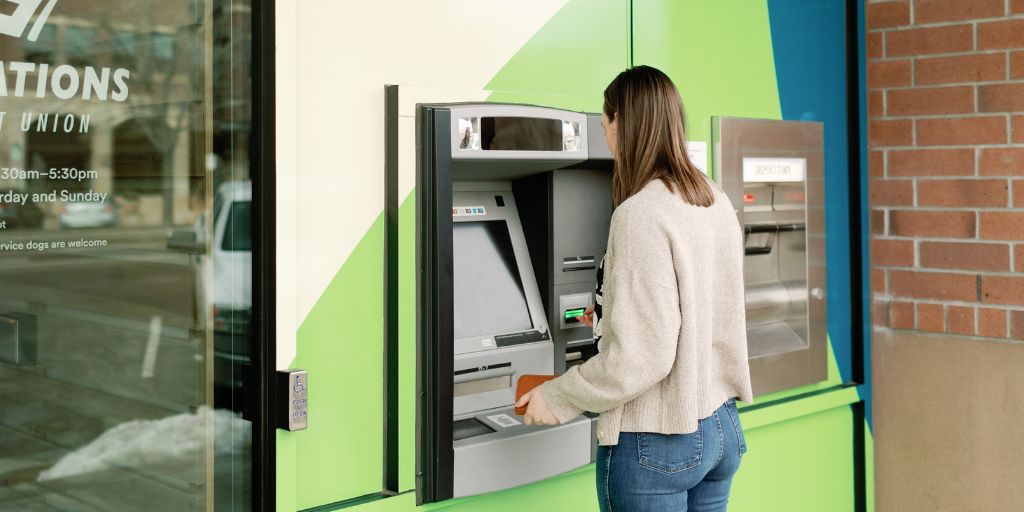Summary
Learning about finances doesn’t have to be overwhelming. Start learning the basics of how to get out of debt, save for your goals and more.
Financial knowledge is key to affording daily life and laying a foundation for the future. However, people often feel they’re on their own when it comes to money management. Children aren’t necessarily required to learn it, and friends and family don’t often discuss it.
The result? “You don’t really get financial literacy training wheels,” said Jake Nelson, a Certified Credit Union Financial Counselor (CCUFC) at Elevations.
At Elevations, we believe financial literacy can be a foundation for achieving goals of eliminating debt, owning a home, affording college tuition and building secure futures.
Here are five steps to getting a better handle on your finances.
1. Understand your money habits

Are you a person who feels money never stays with them for long? Or someone who gets uncomfortable even thinking about budgets?
Keep in mind, your current habits aren’t all your fault. Unsurprisingly, adult approaches to finances are often shaped by how their parents and guardians used and talked about money.1
For example, someone who noticed their parents carefully consider daily expenses might be more financially conservative. Someone whose parents never talked about money or never cut back may be less frugal. A host of other factors — economic climate, marketing, credit card companies, etc. — all play a role too. 2
While your inherited relationship with money isn’t fully your responsibility, what you do with it is.
2. Manage your debt
Before we talk about budgeting and multiplying money, let’s talk about debt.
Despite (or maybe because) the topic can feel overwhelming, it can seem easier to ignore it than address it. However, taking the time to reflect and review debt is the first step to effectively managing it.
Educating yourself on debt management and getting expert advice are key to tackling debt.
Pause and review
If you are digging yourself into a debt hole, you need to stop digging. Borrowing more money or spending more on credit cards (unless it’s part of a recommended debt consolidation plan) can make the problem worse.
Next, it’s time to review your debt. Where are your loans coming from and why? When did they start, and how much are all your interest rates? 4, 5
You need to understand how bad the problem is and how it got there before you decide how to deal with it.
Pay high-interest debt
It’s typically best to pay off high-interest debts first, then move to lower-interest debts.5 Another option is to transfer balances from accounts with high interest to those with lower interest is another option. Some people may find a home equity line of credit (HELOC) can also be beneficial in consolidating high-interest debt.
By talking with a financial counselor, you can make sure to responsibly approach your debt.
Create a monthly payment plan
Often, people can get so buried in debt that they begin paying the monthly minimum. However, this can increase the life of the loan and result in paying much more money towards it.5, 6
As an example, let’s say someone charges $3,000 on a credit card with a 15% interest rate. By only paying the minimum 4% ($200 a month), they’ll pay more than $8,000 and take more than a decade to pay the full amount.
If it’s difficult to increase monthly payments, you might work with a financial counselor on different approaches.5
Reduce expenses

As you pay down your debt, it’s important to reduce your expenses as much as possible. Every dollar saved is another dollar to put towards your payments so you can be debt-free faster. A few tips 5, 7:
- Beware of how subscription and delivery fees add up
- Avoid overdraft fees by opting out of them with your financial institution if possible and signing up for any low-balance alerts
- Shop for low gas prices in your area
- Buy used clothes and wait for sales
- Buy household items and groceries in bulk
- Prepare meals and coffee at home rather than eating out
- If you want to make a larger purchase, take a day to think about it. If you decide to move forward, look for used options, deals or coupons.
3. Create a savings goal and plan
Budgeting can be difficult, especially without a savings goal. Your spending habits have been with you for your whole life. So, willpower and a budgeting app simply isn’t enough.
A savings goal can help motivate you to carefully budget. Your savings goal may be 8, 9:
- An emergency fund with 3-6 months of expenses
- Funds for a trip
- Money towards a down payment
- Saving money to invest
To create a plan to meet your goal, establish the full amount you want to work towards and a reasonable timeline to save this money by. To decide what amount this should be, first review your spending habits over the past several months. Then, create two categories:
- Non-negotiable costs: These are fixed costs that don’t change like your rent, groceries and electric bill.
- Negotiable costs: These are expenses like recreation, entertainment and gifts. See what proportion of your spending is in each category and how much is generally left of your paycheck.
Once you have an idea of how much of your earnings are negotiable, you can set a savings account for your savings goal. Decide on a set amount to use from each paycheck for this goal. Start to treat this as a fixed, non-negotiable cost that’s part of your monthly budget 8, 9.
If you get paid through direct deposit, you can request that a specific percentage of your funds goes to this account each pay period.
A note: 401k contributions are vital for long-term financial capability. As you consider your budget and savings goal, take time to consider how you’ll save for retirement.
4. Put your money to work

Your money could multiply more if you take it from a savings account and put it towards accounts with return rates.
Your money can earn interest through:
- Deposit certificates (CDs)
- Money market accounts
- Other investments
Deposit certificate (CD)
A CD is a short-term account that earns a guaranteed, fixed interest rate. Typically, you can’t access your funds until the term is over. So, make sure money you deposit in a CD isn’t needed for your fixed expenses and emergency fund. Shop around for a CD account that has competitive rates and terms.
You can even keep your funds circulating in CDs by reinvesting funds once each CD closes or opening multiple CDs at once with different lengths. This way, you’ll regain access to those funds as each CD ends.
Pros: Rate is guaranteed and often higher than in money market accounts
Cons: You may not be able to access your funds for a specified period
Money market account
Unlike a CD, you can remove and deposit funds from a money market account. They also don’t have fixed terms. However, money market rates may be lower than CD rates, and the minimum deposit may be greater. If you’ll need to access your funds and don’t want to lose access, a money market account could be a good option.
Pros: Funds are more accessible
Cons: Rates are often lower
More investing options
While investing funds through a CD, money market account, or retirement account is wise, you can also learn to be a savvy investor on your own. As it takes time and careful planning to learn about investing, talking with a financial advisor is an excellent place to start. Alternatively, you can put money in a trusted mutual fund that will invest on your behalf. Keep in mind, 401ks are a form of stock investment as well.
5. Keep adapting the plan

New financial solutions and strategies are always emerging. Keep exploring and talking about your approach towards spending, saving and earning money.
Manage your money for the situation you’re in right now and keep reevaluating as your situation changes. For example, if you just became a traveler, it might be time to look at travel rewards cards. If you have more funds available now than you did a year ago, you might revisit how to multiply that money.
The main idea is that as the world and as your circumstances change, your personal finance approach should also change. Personal finances should be an ongoing topic that you regularly revisit.
6. Seek financial counseling
Financial counseling is for everyone. Seek expert advice and be proactive about your financial situation.
Lastly, financial counseling is personal, just like your financial situation. Your parents’ budget or your neighbors’ budget probably is not going to work for you, making it key to seek outside, expert advice. Your budget should be as personal as your morning routine.
Through financial counseling, you can get advice that works for your specific financial situation and goals.
The path to financial capability

To recap, the steps for gaining financial capability include:
- Identifying your relationship with money
- Understanding the origins of your financial habits
- Managing your debt
- Creating savings goals and plans
- Putting your money to work
- Adapting the plan
- Getting financial counseling
As you gain clarity about your financial habits, you can more strategically manage your debt and savings, and start to multiply your money.
Throughout your financial journey, it’s important to consult financial counselors. Elevations has many Certified Credit Union Financial Counselors (CCUFCs) who are certified through the Credit Union National Association (CUNA) to advise credit union members on sound financial decisions. Ask a branch representative for more information.
Sources
1 LeBaron, Ashley et al, “Parental Financial Education During Childhood and Financial Behaviors of Emerging Adults,” Education Resource Information Center, 2020.
2 Financial Counseling Certification Program, Fifth Edition, p. 17-18, CUNA, 2021.
3 Sesini, Giulia and Lozza, Edoardo, “Understanding Individual Attitude to Money: A Systematic Scoping Review and Research Agenda,” Collabra: Psychology, 2023.
4 “How to Get Out of Credit Card Debt,” National Foundation for Credit Counseling (NFCC).
5 Financial Counseling Certification Program, Fifth Edition, p. 47-49, CUNA, 2021.
6 Harvard Business Review
7 “Saving money and increasing income,” StepChange Debt Charity.
8 “Budgeting and Goal Setting,” Financial Literacy: Managing Your Money at Yale.
9 Financial Counseling Certification Program, Fifth Edition, p. 61-63, CUNA, 2021.


